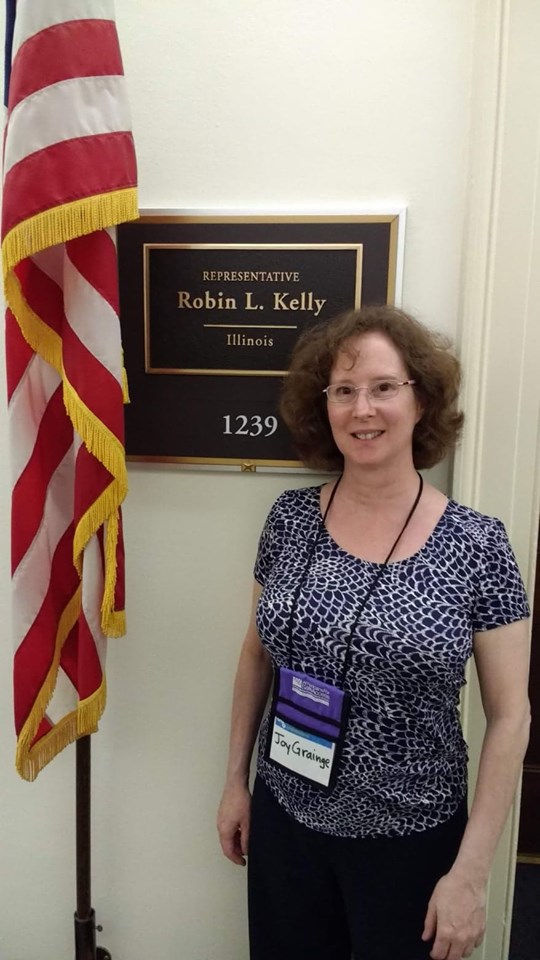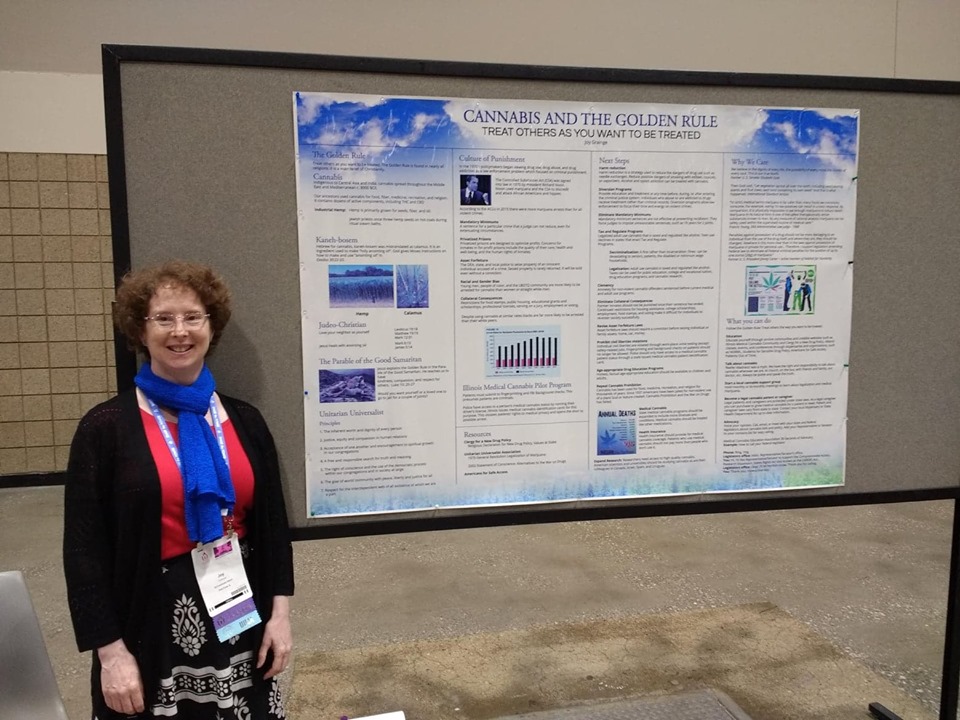Joy Grainge, Naperville, Illinois
Joy Grainge turned to medical cannabis after she injured her neck in 2006, developed spinal stenosis, and then discovered that she had arthritis throughout her body. That was eight years before Illinois, where she lives, got a medical cannabis program running, so she had to rely on the underground market for access.
 She had used cannabis socially as a young person, but, like many people, by her early to mid-twenties she decided she was “an adult now” and adults don’t smoke, so she had stopped. Once that she needed to control her severe chronic pain, that view changed, and she immediately became involved in Illinois state politics.
She had used cannabis socially as a young person, but, like many people, by her early to mid-twenties she decided she was “an adult now” and adults don’t smoke, so she had stopped. Once that she needed to control her severe chronic pain, that view changed, and she immediately became involved in Illinois state politics.
Joy was a lone voice in her town of Homewood, a southern suburb of Chicago, but she connected with activists in the state capital of Springfield to lobby state lawmakers. She also found Americans for Safe Access, becoming a devoted volunteer for Chicago-area events, and in 2013 was an attendee at the inaugural National Unity conference, where she got a chance to lobby her federal representatives in Washington, D.C. Joy has been back to D.C. for several more Unity conferences, and has been a stalwart ASA volunteer for events in the Chicago area.
When Illinois enacted safe access for patients on January 1, 2014, Joy went to work with her city officials, meeting with the mayor and city council to get a dispensary location approved. Again, she was a lone voice, but an effective one.
“Our mayor was very supportive, and most of the city council was open minded,” Joy says. “I think that they saw the benefit to not just the residents but the city in general.”
The city approved the zoning for a dispensary, and Joy says “great folks came in.”
For all that work and accomplishment, Joy still hesitated to enroll in the state program. She was concerned about what the impact of getting a medical cannabis card might be on her driver’s license, and she “had other options.”
By 2018, Joy’s concerns had been allayed by watching how the program rolled out, and she decided the benefits outweighed the risks and she registered with Illinois’ medical cannabis program.
 Joy’s citizen lobbying has always been a combination of state, local and federal, but she’s also done outreach within her church.
Joy’s citizen lobbying has always been a combination of state, local and federal, but she’s also done outreach within her church.
“In 2018, I went to the Unitarian Universalist church conference in Kansas City with a big poster on cannabis and the Golden Rule,” Joy says. “People were encouraged and liked the compassionate aspect and diversion from jail -- it went really well.”
Since January 2020, when the Illinois legislature became the first to make access legal for everyone age 21, Joy has had difficulty finding the products she relies on to control her pain.
“The state has a supply problem now. Strains are unavailable and prices are up,” Joy says. “Many people think products are being held back for the rec market. I’ve had to make do.”
Joy lives in Naperville now, a more western suburb of Chicago, and remains very active, participating in the multi-state facebook group The Medical Cannabis Community and attending city council meetings to lobby them to allow more access. Illinois law allows municipalities to opt in or out of allowing cannabis sales.
“Locally, I work with Opt-In Naperville,” she says. “The city had been talking about an adult-use dispensary, but there has been lots of push back from city council members and others who are part of the state’s Opt Out movement.”
The Naperville city council place a referendum about the matter on the March primary ballot. It passed, but the measure was nonbinding. A majority of the council said they would follow the will of the voters, but they have yet to vote. The city has solicited public comment and will hold a workshop in two weeks.
“We do have a medical dispensary operating, and with COVID-19 they’ve been allowed to operate a drive-thru service, but a delivery service would be helpful,” Joy says. “I hope we get adult-use in town, and on-site consumption would be nice.”
Joy would like to see Illinois adopt a policy of allowing cannabis consumption anywhere tobacco smoking is allowed.
“I live where you can’t have it, so where am I supposed to go?” Joy asks. “I can’t be at home, can’t in my car, and can’t in public – that needs to be fixed.
This profile was originally published in the June 2020 ASA Activist Newsletter
Share this page






















